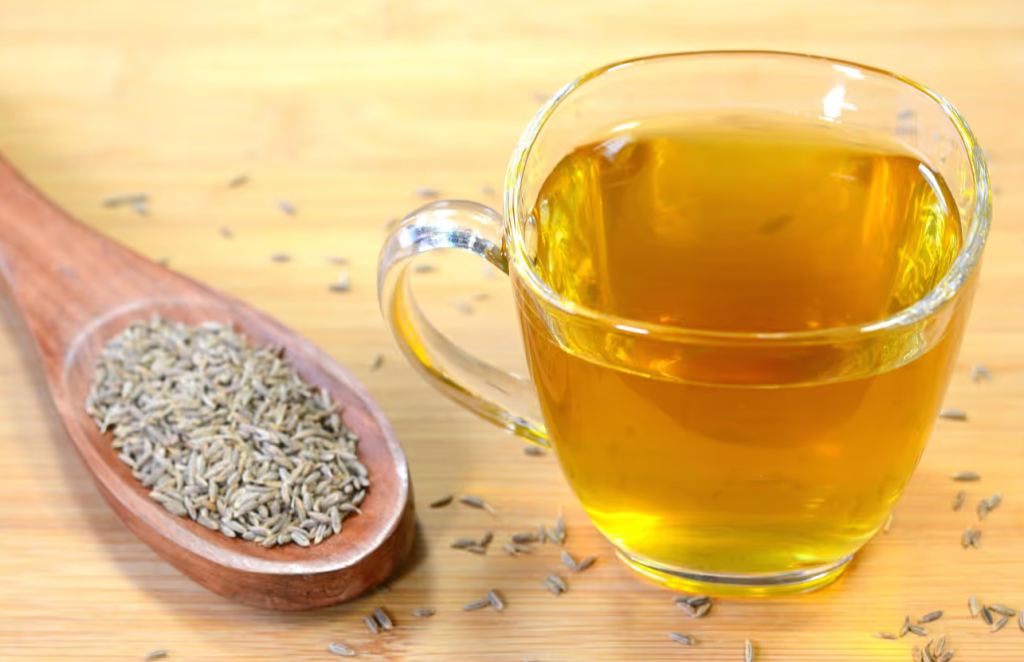Cumin, known as “jeera” in many parts of the world, is a staple spice celebrated for its distinctive flavor and myriad health benefits. Among its various uses, cumin water—a simple infusion of cumin seeds and water—has garnered attention for its potential role in weight management. This article explores the benefits of cumin water, its preparation methods, and considerations for incorporating it into a weight loss regimen.
Nutritional Profile of Cumin
Cumin seeds are rich in antioxidants and essential nutrients. They contain compounds like flavonoids, which act as antioxidants, helping to neutralize free radicals in the body. Additionally, cumin is a good source of vitamins A and C, as well as minerals such as calcium and iron.

Potential Weight Loss Benefits
Several studies suggest that cumin may aid in weight loss and improve body composition:
- Enhanced Metabolism: Cumin has been shown to boost metabolism, thereby increasing the body’s ability to burn calories more efficiently.
- Reduction in Body Fat: Research indicates that individuals consuming cumin powder experienced reductions in weight, waist circumference, fat mass, and body mass index (BMI).
- Improved Lipid Profile: Cumin consumption has been linked to decreased levels of “bad” LDL cholesterol and triglycerides, while increasing “good” HDL cholesterol, contributing to better cardiovascular health.
Preparation Methods for Cumin Water
Incorporating cumin water into your daily routine is straightforward. Here are several methods to prepare it:
Basic Cumin Water:
Soak one teaspoon of cumin seeds in a glass of water overnight.
In the morning, strain the seeds and drink the water on an empty stomach.
Cumin Water with Lemon:
Prepare basic cumin water as above.
Add the juice of half a lemon before consuming. Lemon adds vitamin C and may enhance fat-burning properties.
Cumin and Ginger Infusion:
Boil one teaspoon of cumin seeds and a small piece of crushed ginger in a cup of water for 5 minutes.
Strain and drink the infusion warm. Ginger can boost metabolism and reduce appetite.
Cumin and Cinnamon Tea:
Boil one cup of water and add one teaspoon of cumin seeds along with a small piece of cinnamon stick.
Let it simmer for 5 minutes, then strain and consume. Cinnamon may help regulate blood sugar levels.
Optimal Times to Consume Cumin Water
To maximize the potential benefits of cumin water for weight loss:
Morning: Drinking cumin water on an empty stomach can kickstart metabolism and aid digestion.
Before Meals: Consuming it 30 minutes before meals may help suppress appetite, leading to reduced calorie intake.
After Meals: Having cumin water after meals can promote better digestion and alleviate bloating.
Additional Health Benefits
Beyond weight management, cumin water offers several other health advantages:
Digestive Health: Cumin stimulates the secretion of digestive enzymes, facilitating the breakdown of nutrients and improving gut health.
Anti-inflammatory Properties: The anti-inflammatory effects of cumin may help reduce the risk of chronic diseases such as diabetes and cardiovascular conditions.
Rich in Iron: Cumin is a good source of iron, essential for the production of hemoglobin and overall energy levels.

Considerations and Potential Side Effects
While cumin water is generally safe for most individuals, it’s important to consider the following:
Moderation: Excessive consumption may lead to side effects such as heartburn or low blood sugar levels.
Allergies: Some individuals may be allergic to cumin; discontinue use if any allergic reactions occur.
Pregnancy and Breastfeeding: Consult a healthcare provider before incorporating cumin water into your diet during pregnancy or breastfeeding.
Medication Interactions: Cumin may interact with certain medications, such as anticoagulants; consult with a healthcare professional if you are on medication.
Conclusion
Cumin water is a simple, natural beverage that may support weight loss and offer various health benefits. Incorporating it into a balanced diet and healthy lifestyle can enhance digestion, boost metabolism, and contribute to overall well-being. As with any dietary change, it’s advisable to consult with a healthcare professional to ensure it aligns with your individual health needs.

















